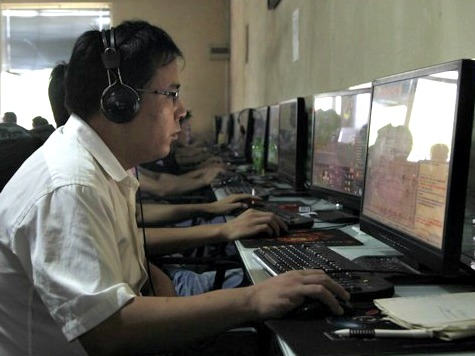The theme of China’s first World Internet Conference held just out of Shanghai this week was an “interconnected world, shared and governed by all”. But the communist authorities tried to get conference attendees to approve a highly repressive 9 point manifesto called the Wuzhen Declaration that was slipped under hotel room doors after midnight on the last day of the conference.
Wuzhen in Zhejiang Province is near the headquarters of Alibaba Group Holding, which just completed the world’s biggest IPO by raising $25 billion in September. The World Internet Conference’s supposed goal was to gather about 1,000 executives of top Chinese and international Internet companies to focus on expanding Internet accessibility to China’s world leading 618 million users.
As a sign of the political importance that the Communist Party leadership pays to the Internet, Chinese President Xi Jinping appointed himself head of the central Internet security and informatization leading group, according to a Feb. 27, 2014 government statement. Xi stressed Internet security was a major strategic issue to the country’s security and that “Efforts should be made to build our country into a cyber-power.”
Xi called for innovative methods to spread mainstream values and stimulate positive energy while maintaining proper guidance of online opinions in terms of timing, intensity and impact to keep cyberspace clean. He stressed that China has to balance its needs of developing IT technologies and safeguarding Internet security, the president said, describing the two issues as “two wings of a bird and two wheels of an engine.”
But Chinese conference organizers knew that many of the type of foreign policy makers who can sign off on an international communiqué either didn’t attend or had left early before making any disclosure of the text of their manifesto, according to a report by the Wall Street Journal.
The Wuzhen Declaration calls on the international community to 1) enhance cyberspace connectivity; 2) respect Internet sovereignty of all countries; 3) jointly safeguard cyber security; 4) jointly fight cyber terrorism; 5) advance development of Internet technology; 6) vigorously develop the Internet economy; 7) widely spread the positive energy; 8) dedicate to the healthy growth of young people; 9) work for a cyberspace shared and governed by all.
The Declaration’s language reflects President Xi’s warnings concerning online risks to the Party. Last November he told a Communist Party meeting that the “Internet and information safety is a new, comprehensive challenge facing us as it concerns state security and social stability.”
China has used terrorism prevention as an excuse to exert tighter control on its residents’ access to online news and services. In August the Chinese government blocked several messaging apps during the Hong Kong pro-democracy protests claiming services like KakaoTalk, Talkbox, Vower, and Didi, were being used to spread terrorism-related information.
The cover letter to the Declaration was signed by the World Internet Conference’s organizing committee members and stated “During the Conference, many speakers and participants suggest [SIC] that a Wuzhen declaration be released at the closing ceremony.” Foreign attendees were given until 8: AM on Nov. 21, 2014 to make any revisions, according to a report by TechCrunch.
In a throw-back to China’s Cultural Revolution, another message was later slipped under hotel doors requesting attendees “Please also put on the commemoration scarf” for the closing ceremonies that had been enclosed in conference welcoming for guests.
The Wall Street Journal reported that at a closed-door session Friday morning Western delegate challenged the Declaration and a trade-group representative explained officials would need time to consider the ramifications of the statement before they could sign it.
With remaining Western attendees in revolt, the wearing of the people’s scarf was quietly cancelled and the World Internet Conference concluded on midday Friday without any further mentioned of the Wuzhen Declaration.
Chriss Street suggests that if you are interested in the U.S. economy, please click on America’s NATO Allies will Force Keystone XL Approval Next Year.

COMMENTS
Please let us know if you're having issues with commenting.